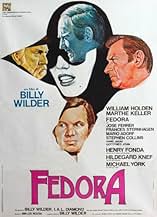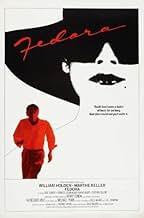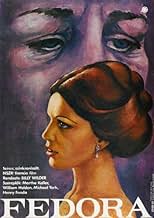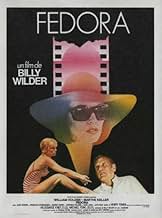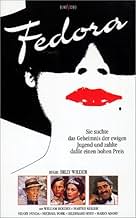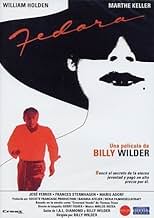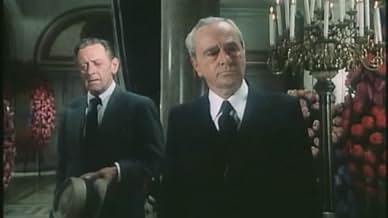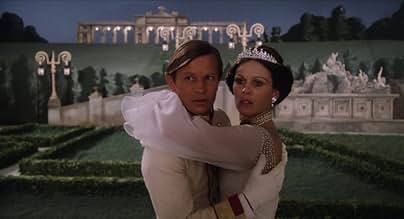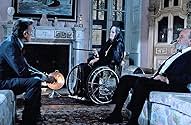PUNTUACIÓN EN IMDb
6,8/10
5,4 mil
TU PUNTUACIÓN
El pobre productor de Hollywood Barry 'Dutch' Detweiler intenta sacar a Fedora, una famosa pero solitaria actriz de cine, de su retiro.El pobre productor de Hollywood Barry 'Dutch' Detweiler intenta sacar a Fedora, una famosa pero solitaria actriz de cine, de su retiro.El pobre productor de Hollywood Barry 'Dutch' Detweiler intenta sacar a Fedora, una famosa pero solitaria actriz de cine, de su retiro.
- Premios
- 1 premio y 1 nominación en total
Robert Cunningham
- Assistant Director
- (as Bob Cunningham)
Argumento
¿Sabías que...?
- CuriosidadesPrior to a preview in Santa Barbara, United Artists had cut twelve minutes from the movie. Director Billy Wilder refused to allow any further cuts, and the screening went poorly, with the audience laughing during the wrong parts of the film.
- PifiasIn the opening scene set in France in 1977, a woman throws herself in the path of a steam train. The last steam locomotives on mainline French railways were withdrawn in 1974, so this could not have happened as shown.
- Citas
The Countess: Remember those days? Moral turpitude? You could have six husbands but you couldn't have an illegitimate child. Now you can have six children and no husband and who cares.
- ConexionesFeatured in Arbeiten mit Billy Wilder: Ein Gespräch mit Mario Adorf (2014)
Reseña destacada
Billy Wilder is celebrated for a streak of movies that starts with the groundbreaking film-noir "Double Indemnity" and "Lost Weekend" and ends with the comedy classics "Some Like it Hot" and "The Apartment". In between, you have such titles as "Sunset Blvd.", "Stalag 17", Sabrina" and "Witness for the Prosecution", I guess if any movie lover was asked about the 10 greatest movies from the Golden Age, a fistful of Billy Wilder films would be mentioned.
This is just to say that this is the kind of legacy a foreign director, who escaped from the Nazis and never got rid of his German accent, can be damn proud of, he literally owned American cinema and defined many genres. After the sixties, he still had a share of enjoyable movies but they never reached the same iconic status. And when the New Hollywood was built on the ruins of the studio system, Billy Wilder became the incarnation of old school, conventional cinema: big names, big stars and big stories. Wilder's motto was "thou shall not bore the audience" but then came a time where moviegoers, mostly grown-up baby boomers, were enthralled by the spectacle of Bonnie and Clyde's machine-guns, the French Connection' chase, Scorsese's mean streets and the intimacy of the Corleone family. Wilder became the bore, audience-wise.
"Those kids with beards are running things" laments the has-been Larry Detweiller aka "Dutch" played remarkably by William Holden, and his words couldn't have echoed more Billy Wilder's resentment toward the new ways of Hollywood or what was left of it. In the midst of the raging bulls and easy riders' era, the merit of "Fedora" is to provide the interesting insight from a director of the old generation. When the time of Ford, Minnelli or Hitchcock was over, Wilder was still here and made one, deliberately conventional and classic move or movie, so against the current it was meant to fail. But now, after four decades, "Fedora" has aged surprisingly well. It's not a masterpiece but the story is likely to content the movie lovers we are.
In fact, it illustrates this quote from Jean-Luc Godard: "the best way to criticize a film is to make one". And Billy Wilder, adapting the novel 'Crowned Heads', paid a tribute to the Golden Age through the portrayal of Fedora, a star who used to be big but then saw her stardom fade, only to resurrect a few years after. When asked if there was any similarity between "Fedora" and "Sunset Blvd.", Wilder naively said no, but even though it wasn't intentional, one can't have a cinema-themed Billy Wilder's film, featuring William Holden, much more in the narrator's role, and not have "Sunset Blvd." in mind. If anything, the film comes full circle with the classic noir: in the 70's, the Golden Age was the silent era, they didn't need blazing guns and naked breasts, only dialogues and faces.
Fedora was the biggest of her time, mentioning real-life stars and fictional movies as if the film was set in a parallel universe yet close to the reality, just like Norma Desmond interacting with Cecil B. De Mille, as to emphasize the dream-like aura of Hollywood. Then she abruptly ended her career and lived in in remote locations on the Riviera and started to make movies again after a few years of absence, this is where Dutch comes, trying to approach her to star in an adaptation of Anna Karenina, He notices some strange happenings, Fedora seems imprisoned by a group of people as colorful as intimidating: an old Countess with a husky voice (Hildegard Knef), a mysterious plastic surgeon played by Jose Ferrer and a sinister watchdog played by Frances Sternhagen (she was the sheriff's wisecracking wife in "Misery").
The "Sunset Blvd." déjà vu deepens and Dutch' investigation leads to the ultimate revelation about the story of Fedora. And it is intriguing and haunting within its own limitation with a fascinating mix of real actors like Henry Fonda and Michael York, in the intrigue. The main problem with the film is that the peripheral characters actually work better than the central one, Holden is perfect but like many critics pointed out, there had to be an actress of Marlene Dietrich' caliber to play the faded star because the flashbacks don't leave us with the conviction of a Golden Age aura on Fedora. There had to be a Katharine or Audrey Hepburn, Ingrid Bergman, but I guess the film was victim of its era, Wilder didn't have the same touch and only his old buddy William Holden was here to close the loop with "Sunset Blvd.".
But I love the way the film feels like a swan song of the old school and close the curtain on Wilder's five-decade contribution to Cinema, as if he was paying a final tribute to his art. He would later make a film with Lemmon and Matthau, a remake of a French classic farce but the film was of such abysmal quality it was dismissed as part of Wilder's canon, and "Fedora" is a worthy ending to his prolific career. I didn't necessarily enjoy the film, I would say I watched it with mere curiosity, able to appreciate its intent more than its result, but the making of the film is very fascinating, seeing the old Wilder wrestling with the new system to get his film made, along with I.A.L Diamond, is a great lesson of humility and determination.
After knowing the truth about Fedora, which is a self-referential cased of Naked Empress, Dutch says it would make a better story than the one he had in mind; I guess the same goes with the making of 'Fedora',
This is just to say that this is the kind of legacy a foreign director, who escaped from the Nazis and never got rid of his German accent, can be damn proud of, he literally owned American cinema and defined many genres. After the sixties, he still had a share of enjoyable movies but they never reached the same iconic status. And when the New Hollywood was built on the ruins of the studio system, Billy Wilder became the incarnation of old school, conventional cinema: big names, big stars and big stories. Wilder's motto was "thou shall not bore the audience" but then came a time where moviegoers, mostly grown-up baby boomers, were enthralled by the spectacle of Bonnie and Clyde's machine-guns, the French Connection' chase, Scorsese's mean streets and the intimacy of the Corleone family. Wilder became the bore, audience-wise.
"Those kids with beards are running things" laments the has-been Larry Detweiller aka "Dutch" played remarkably by William Holden, and his words couldn't have echoed more Billy Wilder's resentment toward the new ways of Hollywood or what was left of it. In the midst of the raging bulls and easy riders' era, the merit of "Fedora" is to provide the interesting insight from a director of the old generation. When the time of Ford, Minnelli or Hitchcock was over, Wilder was still here and made one, deliberately conventional and classic move or movie, so against the current it was meant to fail. But now, after four decades, "Fedora" has aged surprisingly well. It's not a masterpiece but the story is likely to content the movie lovers we are.
In fact, it illustrates this quote from Jean-Luc Godard: "the best way to criticize a film is to make one". And Billy Wilder, adapting the novel 'Crowned Heads', paid a tribute to the Golden Age through the portrayal of Fedora, a star who used to be big but then saw her stardom fade, only to resurrect a few years after. When asked if there was any similarity between "Fedora" and "Sunset Blvd.", Wilder naively said no, but even though it wasn't intentional, one can't have a cinema-themed Billy Wilder's film, featuring William Holden, much more in the narrator's role, and not have "Sunset Blvd." in mind. If anything, the film comes full circle with the classic noir: in the 70's, the Golden Age was the silent era, they didn't need blazing guns and naked breasts, only dialogues and faces.
Fedora was the biggest of her time, mentioning real-life stars and fictional movies as if the film was set in a parallel universe yet close to the reality, just like Norma Desmond interacting with Cecil B. De Mille, as to emphasize the dream-like aura of Hollywood. Then she abruptly ended her career and lived in in remote locations on the Riviera and started to make movies again after a few years of absence, this is where Dutch comes, trying to approach her to star in an adaptation of Anna Karenina, He notices some strange happenings, Fedora seems imprisoned by a group of people as colorful as intimidating: an old Countess with a husky voice (Hildegard Knef), a mysterious plastic surgeon played by Jose Ferrer and a sinister watchdog played by Frances Sternhagen (she was the sheriff's wisecracking wife in "Misery").
The "Sunset Blvd." déjà vu deepens and Dutch' investigation leads to the ultimate revelation about the story of Fedora. And it is intriguing and haunting within its own limitation with a fascinating mix of real actors like Henry Fonda and Michael York, in the intrigue. The main problem with the film is that the peripheral characters actually work better than the central one, Holden is perfect but like many critics pointed out, there had to be an actress of Marlene Dietrich' caliber to play the faded star because the flashbacks don't leave us with the conviction of a Golden Age aura on Fedora. There had to be a Katharine or Audrey Hepburn, Ingrid Bergman, but I guess the film was victim of its era, Wilder didn't have the same touch and only his old buddy William Holden was here to close the loop with "Sunset Blvd.".
But I love the way the film feels like a swan song of the old school and close the curtain on Wilder's five-decade contribution to Cinema, as if he was paying a final tribute to his art. He would later make a film with Lemmon and Matthau, a remake of a French classic farce but the film was of such abysmal quality it was dismissed as part of Wilder's canon, and "Fedora" is a worthy ending to his prolific career. I didn't necessarily enjoy the film, I would say I watched it with mere curiosity, able to appreciate its intent more than its result, but the making of the film is very fascinating, seeing the old Wilder wrestling with the new system to get his film made, along with I.A.L Diamond, is a great lesson of humility and determination.
After knowing the truth about Fedora, which is a self-referential cased of Naked Empress, Dutch says it would make a better story than the one he had in mind; I guess the same goes with the making of 'Fedora',
- ElMaruecan82
- 29 sept 2016
- Enlace permanente
Selecciones populares
Inicia sesión para calificar y añadir a tu lista para recibir recomendaciones personalizadas
- How long is Fedora?Con tecnología de Alexa
Detalles
- Fecha de lanzamiento
- Países de origen
- Idiomas
- Títulos en diferentes países
- Федора
- Localizaciones del rodaje
- Madouri Island, Lefkada, Grecia(Fedora's private island)
- Empresas productoras
- Ver más compañías en los créditos en IMDbPro
Taquilla
- Presupuesto
- 6.727.000 US$ (estimación)
- Duración1 hora 56 minutos
- Mezcla de sonido
- Relación de aspecto
- 1.85 : 1
Contribuir a esta página
Sugerir un cambio o añadir el contenido que falta

Principal laguna de datos
By what name was Fedora (1978) officially released in India in English?
Responde

